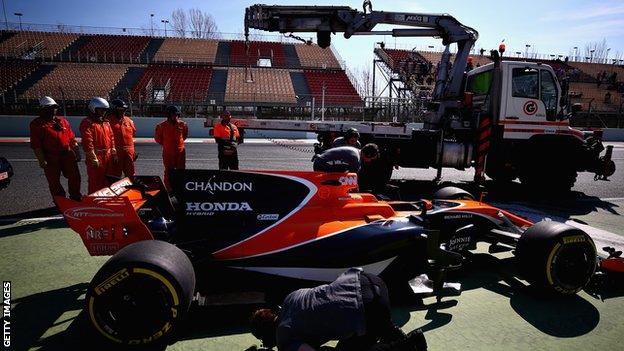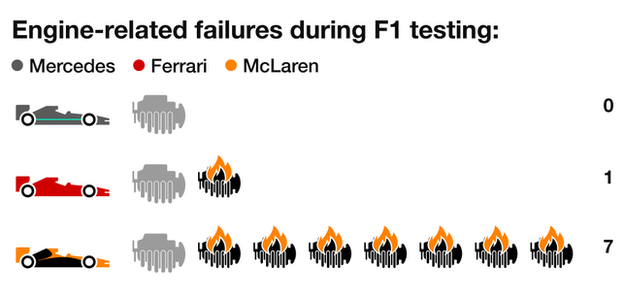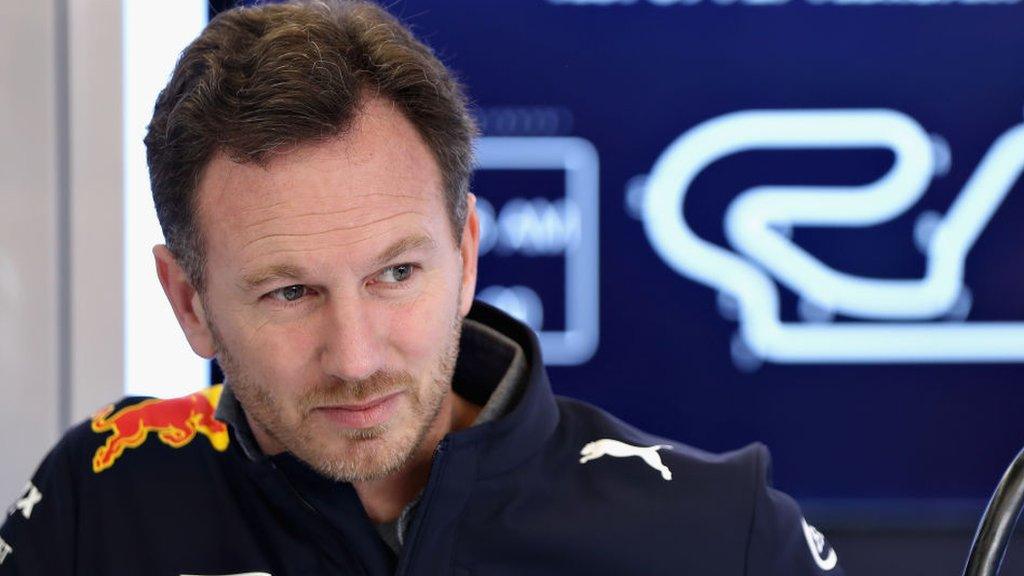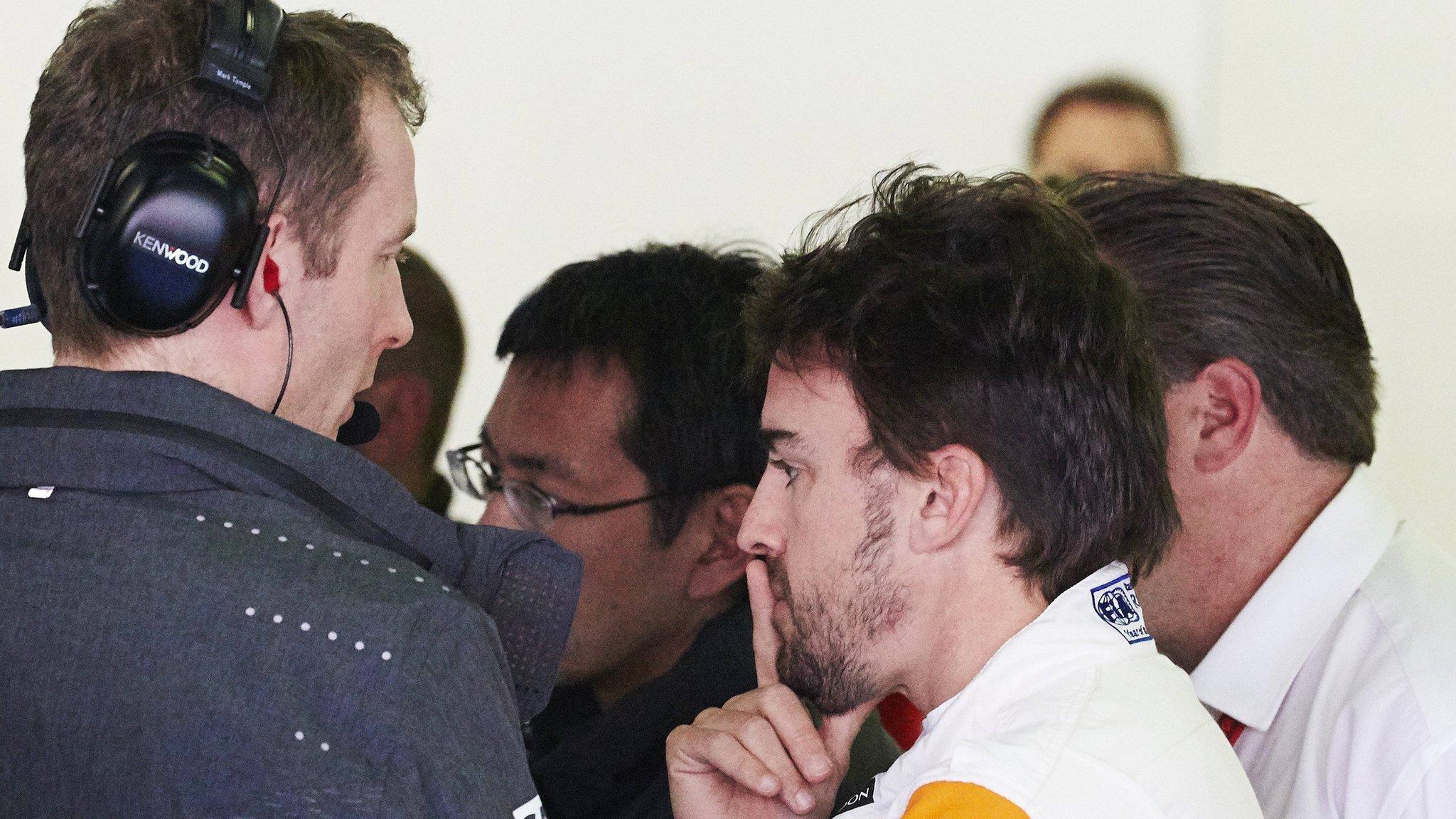McLaren explore Mercedes engine option after Honda problems
- Published
- comments

McLaren and engine partner Honda have suffered a troubled pre-season programme
McLaren have made an exploratory approach to Mercedes about engine supply in the wake of problems with partner Honda.
The move follows a dismal pre-season test programme for McLaren-Honda, in which the Japanese company's new engine was both unreliable and uncompetitive.
McLaren are said to be evaluating options in the event the relationship with Honda cannot be made to work.
McLaren and Mercedes were unavailable for comment.
McLaren racing director Eric Boullier said during last week's final pre-season test that there was "no plan at all" to end the Honda relationship.

Any switch to an alternative engine supplier would require McLaren to find a way out of its multi-year contract with Honda, which was signed in 2013.
McLaren's contact with Mercedes was characterised by sources as informal and brief and has not led to any resolution on either side.
But the Mercedes board and motorsport boss Toto Wolff are said to be open-minded about the possibility of supplying their former partner.
Linking up with Mercedes - or Renault, which is another option - would be a momentous decision for McLaren with huge potential consequences because the Honda engine deal is worth close to a net $100m annually to the team compared to a customer engine deal.
As well as supplying free engines rather than paying the 17m euros (£14.8m) annual fee for a customer of Mercedes, Honda also pays half of McLaren's driver-salary bill and a significant sponsorship contribution.
If the Honda partnership was ended, McLaren's main shareholders - Bahrain's Mumtalakat sovereign investment fund and Saudi businessman Mansour Ojjeh - would almost certainly have to plug the gap themselves until a major sponsorship deal could be found, something with which McLaren have struggled in recent years.
Mumtalakat owns 50%, Ojjeh's TAG Group 25% and together they form the executive committee that runs McLaren. The remaining 25% is owned by former chief executive officer Ron Dennis, whose contract was not renewed in January and who no longer has any active role in the company.
McLaren and Mercedes were factory partners for 15 years until the end of 2009, when Mercedes set up their own team, partly because of the souring of the relationship over a number of issues. McLaren continued to use the German company's engines for the next five years as a customer.
The Mercedes engine has been the best in F1 since the introduction of turbo hybrid power-plants in 2014, when McLaren could finish only fourth in the championship, scoring only two podium finishes and no wins.
When McLaren signed with Honda, Dennis gave as the main reason for leaving Mercedes that it was not possible to win in F1 unless a team was an official factory partner of a major engine manufacturer. It is an argument that continues to be made frequently by senior McLaren figures to justify the decision.
But it appears McLaren are having doubts that Honda will ever produce a competitive engine and have decided that switching to a customer deal should at least be considered and the possibility explored.
McLaren were the slowest team in pre-season testing, which concluded last Friday, and their fastest lap time was 2.7 seconds slower than pace-setters Ferrari.
Boullier said in an interview with Spain's AS, external newspaper conducted during testing last week that he believed McLaren could win with a Mercedes engine.
The Frenchman added that McLaren risked losing their star driver, two-time world champion Fernando Alonso, if they could not become competitive this year.
The Spaniard joined McLaren for the start of the Honda deal in 2015, believing it would give him a better chance of winning the title than his previous team Ferrari. Alonso, whose contract with McLaren expires at the end of this season, has not won a race since May 2013.
Boullier said: "He wants to be competitive because he has talent to show the world and to himself. And we need to be competitive to keep him happy.
"If we're competitive he'll be happy and if not he'll take his own decisions."

- Published16 March 2017

- Published11 March 2017
- Published7 March 2017
